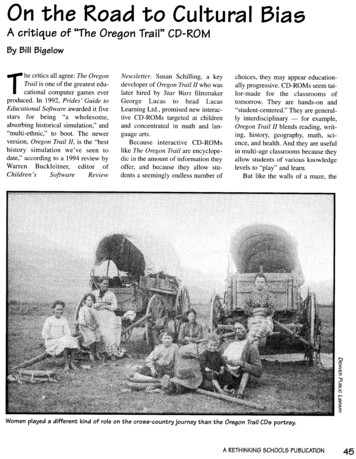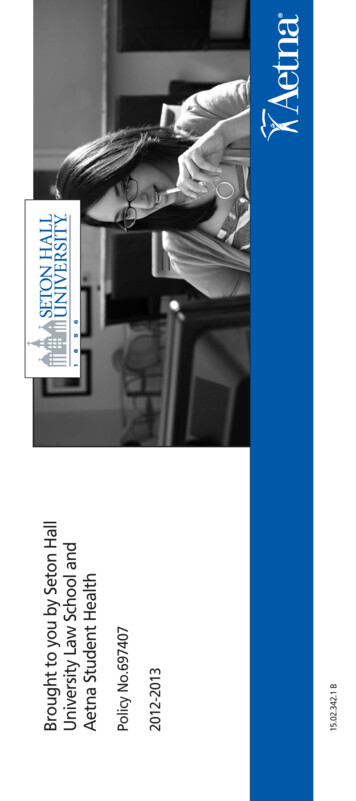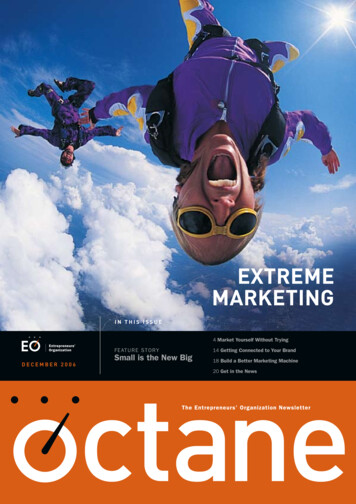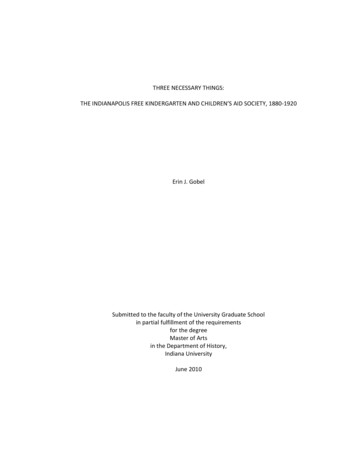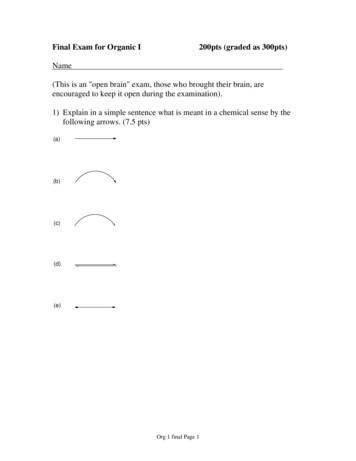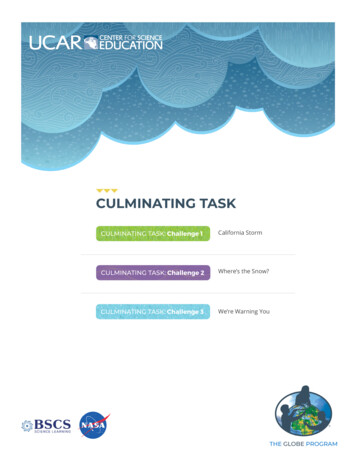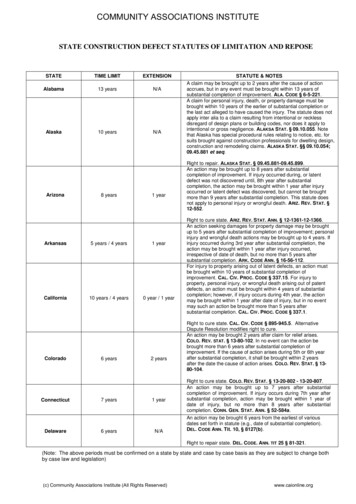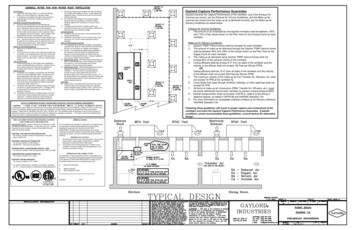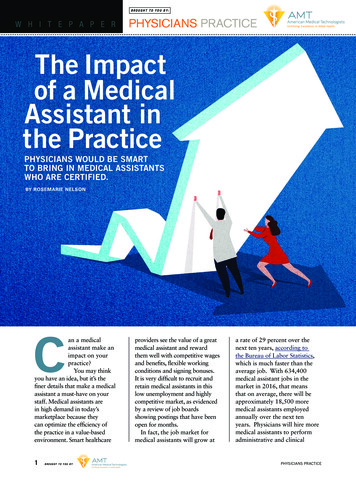
Transcription
B R O U G H T T O Y O U B Y:W H I T E P A P E RThe Impactof a MedicalAssistant inthe PracticePHYSICIANS WOULD BE SMARTTO BRING IN MEDICAL ASSISTANTSWHO ARE CERTIFIED.BY ROSEMARIE NELSONCan a medicalassistant make animpact on yourpractice?You may thinkyou have an idea, but it’s thefiner details that make a medicalassistant a must-have on yourstaff. Medical assistants arein high demand in today’smarketplace because theycan optimize the efficiency ofthe practice in a value-basedenvironment. Smart healthcare1BROUGHT TO YOU BYproviders see the value of a greatmedical assistant and rewardthem well with competitive wagesand benefits, flexible workingconditions and signing bonuses.It is very difficult to recruit andretain medical assistants in thislow unemployment and highlycompetitive market, as evidencedby a review of job boardsshowing postings that have beenopen for months.In fact, the job market formedical assistants will grow ata rate of 29 percent over thenext ten years, according tothe Bureau of Labor Statistics,which is much faster than theaverage job. With 634,400medical assistant jobs in themarket in 2016, that meansthat on average, there will beapproximately 18,500 moremedical assistants employedannually over the next tenyears. Physicians will hire moremedical assistants to performadministrative and clinicalPHYSICIANS PRACTICE
duties, to more effectively utilizethe physicians’ time. As morephysicians retire and physicianshortages increase, especiallyin primary care, physiciancentered practices are shiftinginto patient-focused teams withshared responsibility of care.Medical assistants will share inthat team care.Medical assistants can be veryeffective to your practice andhelp you achieve high marks onpatient satisfaction, optimizeGroup, physicians rely heavilyon their medical assistant forfollow up on pending ordersand follow through with labresults. Dorothy Butler, aRegional Manager at Novantin Charlotte, N.C. calls it “amarriage”. She says the medicalassistant for each physiciankeeps the office and physicianflowing effectively.Medical assistants can greatlyimprove communication withthe patient. Karen Ripper, CEOMEDICAL ASSISTANTS CAN BE VERYEFFECTIVE TO YOUR PRACTICE ANDHELP YOU ACHIEVE HIGH MARKS ONPATIENT SATISFACTION, OPTIMIZEREIMBURSEMENT, AND SCORE BIGIN QUALITY CARE MEASURES.reimbursement, and score big inquality care metrics. They canearn the trust and confidenceof your patients every day onthe telephone and in person.Enhanced roles for the medicalassistant in patient outreach,health coaching, schedulingappointments, and clinical chartpreview and review can optimizepractice resources.SIGNIFICANT IMPACTThe impact of medical assistantson patient and providersatisfaction, quality care andreimbursement can be significantin a well-run practice, or ofminor impact where the medicalassistants are underutilized.At Novant Health Medical2BROUGHT TO YOU BYof the Day Medical Centerin Stuart, Fla., attributes thepractice’s improved patientsatisfaction results specificallyto one administrative medicalassistant that understandsthe mission is to answer thetelephone within two rings, toget the patient in to be seen andto greet each patient warmly,welcoming the patient as if thatpatient is a VIP.Administrative medicalassistants can answer incomingtelephone calls from patientswith questions or concernsand schedule the patient for anappointment as needed. Patientsare more satisfied explainingtheir issue to a clinical personrather than leaving a messagewith a non-clinical personand waiting for a return callto repeat everything theyhad already relayed. A highpercentage of telephone callsare repeat calls, according toresearch in Family PracticeManagement, but those can besignificantly reduced by usingmedical assistants instead ofnon-clinically trained staff. Inaddition to reducing the amountof work for staff managingrepeat calls, the patients arehappier when their issue ishandled during their firsttelephone call into the practice.The clinical medical assistantsin a family medicine practicein Fayetteville, N.Y. discuss themedication list with the patientsduring the rooming process tohelp educate them about whateach medication is for and howbest to take it. Robert Feldman,MD, family medicine physician,says that intake process “savesme time in the exam room sothat I can focus on the patient’sacute and chronic conditions.”The medical assistants alsoperform discharge duties atthe Day Medical Center withinternal medicine physician Dr.Emmet Kenney’s patients. Theydo this by completing any ordersin the exam room with thepatient, such as scheduling followup appointments, administeringinjections, or instructing thepatients about diagnostic orders.STRONG PATIENTRELATIONSHIPSimply because medical assistantsspend more time with patients(answering their telephonecalls, performing outreach,processing call backs to thepatient, performing intake,rooming and discharge with thepatient) than the physician, thepatients develop a high level oftrust in the medical assistant.PHYSICIANS PRACTICE
This trust often is exhibited ininformation the patient shareswith the medical assistant,information that the patient maybe uncomfortable discussingwith the physician. The medicalpractice that supports andencourages these relationshipswill benefit with improvedpatient satisfaction and higherquality scores. The patient thatputs their trust in the medicalassistant will more likely acceptthe coaching and instructionsfrom that medical assistant andadhere to the treatment plan.As the patient grows to trustthe medical assistant, theybecome more comfortablerelying on them for informationabout their chronic disease, theirmedicines, and their treatmentplans. Patients that visit or callthe practice very frequently(almost monthly) look to thatmedical assistant as their caremanager. Even if the medicalpractice does not label themedical assistant with the officialrole of care manager, a competentmedical assistant performingat the top of their scope ofpractice can evolve into one astheir relationship with patientsdevelops. They communicatewith the patient to assess theirneeds and consult with thephysician on the appropriateservices for the patient.The medical assistant ashealth coach and educatorcreates an active partnershipwith the patient. The medicalassistant is more likely thanthe physician to uncovernon-adherence and coach thepatient through the obstacles.Taking the time, buildingthe relationship, providinga safe and non-judgmentalenvironment for the patientultimately results in adherenceto goals and objectives andimproves quality scores, with the3BROUGHT TO YOU BYupshot of better reimbursementand improved patient care.COST BENEFITSTypically, medical practices find iteconomical to recruit and retainmedical assistants for the clinicalcare team instead of licensed orregistered nurses. The generalranges for hourly rates are lowerfor medical assistants, so salaryand benefit costs are lower in amedical practice that employsmedical assistants instead ofnurses, which means profitabilityis higher.However, aside from thesimple salary and benefitcost calculation, the revenuegeneration aspect of usingmedical assistants in the practiceshould be considered. Forexample, by employing medicalassistants and developingprotocols and clinical careexpectations, the medical practicecan save physician time witheach patient, which allows thephysician to see more patients.Take the case of Patsy Brown,administrator of Summit MedicalAssociates in Hermitage, Tenn.She found that by employingmedical assistants who arecertified (credentialed) to previewschedules for missing screenings,the practice earned financialbonuses for hitting quality ofcare initiatives. Seeing morepatients in a value-based modelimproves access measures andquality of care by reachingpatients that may not have beenaccommodated. (If a patient doesnot get an appointment, they donot get their wellness exams norreceive recommended screenings).Success in the value-basedhealthcare delivery systemincludes better quality scores.Researchers at the Universityof Cincinnati found thatpractice transformation requiresstrong relationships betweenthe professionals having maincontact with patients and theircolleagues. Summit MedicalAssociates’ physicians andmedical assistants exemplify thisresearch finding in their PatientCentered Medical Home (PCMH)team-based practice models withtheir physician-medical assistantteams. The result of these highfunctioning teams for Summit isincreased medical revenue.When a medical assistantworks at the top of their scopeof practice, it means they areperforming clinical dutiesand tasks that providers donot need to perform, such aselectrocardiograms, phlebotomyand lab testing, data entryinto the EHR, diagnosticprocedures, suture removal,patient education, and coaching.Medical assistants can makethe outgoing telephone calls topatients to deliver test results,explain medication and dosingchanges and to schedule patientsfor follow up appointmentsor screenings as needed. Thephysician is relieved of thenon-face-to-face care, whichis a significant responsibilityin value-based care, andallows them to form betterrelationships of their own withthe patient. Better relationshipsresult in improved quality scoresand better reimbursement.CERTIFICATION:CRITICAL TO SUCCESSMedical practices want to hirethe best, qualified individualwho will make a positivecontribution to quality patientcare. Certified professionalsfunction at the top of theirscope of practice, which bringsa higher level of efficiency andvalue to the medical practice.Russell West, talent acquisitionprofessional, with NorthwesternMedicine in Chicago, Ill., saidPHYSICIANS PRACTICE
MAKINGTHE GRADE ithout a medical assistant, a medical practiceineffectively uses physician time and may not meetthe needs of the patients.Imagine the practice with no medical assistant. Whogreets and rooms the patient? Who answers patienttelephone calls regarding clinical issues? Whoadministers the flu shot? Who weighs the baby?Who obtains the patients’ vital signs, retaking a bloodpressure when the patient asks to have it repeatedbecause the first reading is high? Who performs anelectrocardiogram? Who follows up on missing labtest results?Some would answer that a nurse or even thephysician can complete these duties. But consider thecost of physicians and nurses taking on those roles.Aside from significantly higher salary, the missedopportunity of what the physician or nurse could bedoing instead of performing the duties of a medicalassistant is very costly. Patient access to the practice isreduced and physician satisfaction is low. Patients arenot happy if they have long wait times and don’t havetheir calls returned in a timely manner.A medical assistant creates value in the practice bymaking the operation flow effectively. Althoughsome medical assistants perform both administrativeand clinical functions, others may choose to focus onjust one side. Typically, a certification exam will coverboth. In successful practices, such as FayettevilleGastroenterology Associates of Fayetteville N.C.,medical assistants rotate through administrativeand clinical roles, which creates a cross-trainedteam that does not become complacent in theirduties. Because medical assistants cover a rangeof responsibilities, they can be your most flexiblepractice resource.ADMINISTRATIVE Telephone skills for receiving incoming calls andmaking outgoing calls to meet patient needs. Patient registration in the practice managementsystem including capturing insurance information. Understanding insurance protocols and regulationsfor properly scheduling lab and diagnosticprocedures for patients and obtaining authorizationand referrals (verifying the patient is eligible for theservice under their insurance plan) per physicianorders. Fluent in the technology of the practice (telephoneand voicemail system, auto-attendant and calltransfer, practice management and EHR, insuranceeligibility, e-fax, scanning documents intoappropriate systems and files, ancillary systems fororder and result processing at affiliated diagnosticand hospital systems).CLINICAL Understanding that the priority is the check-in,rooming, and discharge of the patients with thegoal to keep providers on schedule. Capability to capture the patient history, verificationof medications, take vitals, and record the reasonfor visit during the rooming process and preparethe patient for a physical exam or procedure. Administer injections per physician orders. Enter orders into the computer system, as directedby the physician. Perform certain laboratory tests. Schedule follow up appointments for patients as acomponent of patient visit discharge. Prepare exam rooms daily and turn over examrooms for each patient visit. Sterilize medical equipment. Dispose of contaminated supplies. Knowledge of appointment scheduling protocolsfor acute and/or urgent visits and skilled in thetechnology for scheduling patient visits. Capability to review appropriateness of the dailypatient schedule and take corrective action asnecessary (i.e. if the appointment is for review oflabs, but no lab results are available, reschedule thepatient with instructions to obtain labs).4BROUGHT TO YOU BY Perform phlebotomy services as ordered by thephysician. Perform electrocardiograms, suture removal, andchange dressings. Educate patients regarding discharge instructions,medication dosing protocols, and treatment plan,providing face-to-face coaching.PHYSICIANS PRACTICE
education and certificationis required because the scopeis vastly different; medicalassistants need more and betterskills. Novant Health MedicalGroup also requires all medicalassistants be certified.Medical assistants that havebeen certified require less on thejob training, which means theywill be performing as needed inthe practice more quickly. Infact, employers are looking atcertification as a way to assessCertain state laws and federalregulations, especially if thepractice sees Medicaid patients,also require certification tofully practice in the field. Whilecertification is not required in allstates, employing credentialedmedical assistants enhances yourpractice operations.Certification shows acommitment to the professionand demonstrates that themedical assistant meetsrigorous standards establishedMEDICAL ASSISTANTS THAT HAVE BEENCERTIFIED REQUIRE LESS ON THE JOBTRAINING, WHICH MEANS THEY WILLBE PERFORMING AS NEEDED IN THEPRACTICE MORE QUICKLY.whether an individual possessesthe skills and knowledge requiredfor successful performance.The requirements foreligibility to sit for thecertification examinationgenerally include completion ofa rigorous training program thatis suitably accredited or proofof a certain number of yearsof work as a medical assistant.Medical assistant education canbe two-year college programs,one-year diploma programs, ornine-month certificate programs.Once a medical assistantprogram is completed or therequired work experience hasbeen met, a medical assistantmay become nationally certified.5BROUGHT TO YOU BYand verified by a third-partyorganization. It also showsdedication to maintainingquality and continued educationon a regular basis. Medicalassistants who are certifiedare required to maintaincertification and thereforestay abreast of changes in theindustry, including innovation inthe role of the medical assistantas the healthcare industrycontinues to evolve. It is in thebest interest of the practice tomonitor certification status oftheir employees to maintain thehighest quality of care. Valuebased care initiatives presentnew demands on the medicalpractice and medical assistantscan play a key role withappropriate training.By hiring and deploying acredentialed medical assistant,the medical practice canachieve higher levels of patientsatisfaction and improve qualitycare initiatives, while optimizingphysician time and increasingreimbursement for a profitableoperation.CONCLUSIONWell-qualified medical assistantsdevelop relationships withpatients that reduce the timeburden felt by physicians andkeep the patients happy andsatisfied with the care andservice they receive. Bothadministrative and clinicalmedical assistants contributeto streamlined patient flow,effective facility utilization,improved quality initiatives andbetter reimbursements.The Family Medicine ofWeston practice in Weston,Fla. has successfully recruitedand retained medical assistantsfor every administrative andclinical position. The practiceachieves high patient satisfactionscores with high marks fromcontracted payers.Dr. Alberto Rengifo, thephysician owner of the fiveprovider practice, values andrewards the medical assistants,because he knows they arethe key that takes the medicalpractice from good to great inthe eyes of the patients, in dayto-day satisfaction, and in thefinancial success of the practice.Rosemarie Nelson is a professionalspeaker and consultant with30 years experience in healthcare as a practice manager, ininformation technology, and as aconsultant to physician practices,specializing in practice operationsmanagement and electronicmedical record systems.PHYSICIANS PRACTICE
generation aspect of using medical assistants in the practice should be considered. For example, by employing medical assistants and developing protocols and clinical care expectations, the medical practice can save physician time with each patient, which allows the physician to see more patients. Take the case of Patsy Brown,
